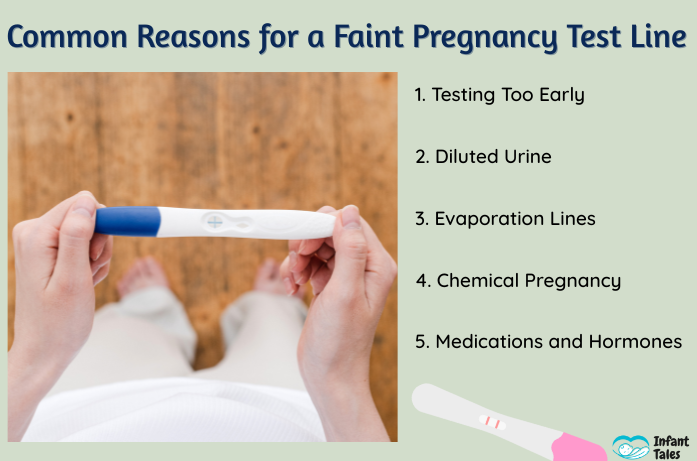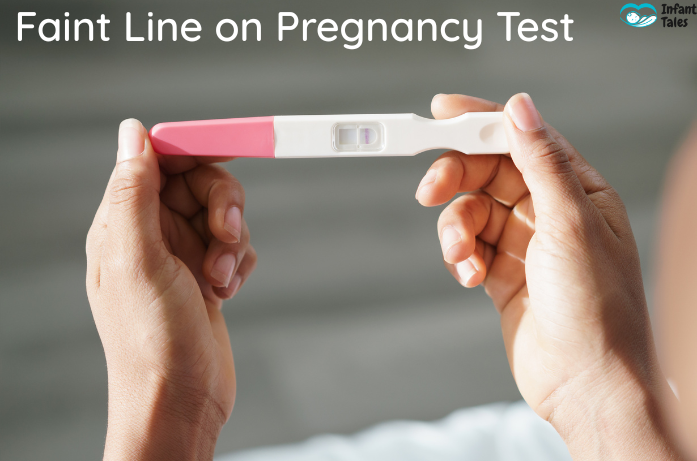By a Caring Mom at Infant Tales
You’ve been waiting, heart pounding, eyes fixed on the little window of your pregnancy test and there it is: a faint line on pregnancy test. It’s barely visible, yet it changes everything. For some, it’s a sign of joy and new beginnings; for others, it brings uncertainty and questions.
So, what exactly does it mean when you see a faint line on a pregnancy test? Is it a sure sign of pregnancy or just a test error? This guide explains everything from why you see that faint line to when you should test again. All in a warm, reassuring tone meant to guide and comfort new or expectant parents.
Understanding How Pregnancy Tests Work
Most home pregnancy tests detect a hormone called human chorionic gonadotropin (hCG), a hormone produced after the fertilized egg implants in the uterine wall. In the early stages of pregnancy, hCG levels in your body are very low, but they rise rapidly over the next two or three days.
When HCG is present, the test strip reacts and forms a visible line. If the levels are still low as they often are in the earliest days you might only see a faint line pregnancy test result. In most cases, a line (no matter how faint) signifies that HCG is present and thus pregnancy is possible.
However, some faint lines can also appear due to other factors, so understanding the reason behind it is key.
What a Faint Line Really Means
A faint line on a pregnancy test is mainly an indicator of early pregnancy that your body has begun to produce HCG, but the concentration is still not enough to generate a darker line.
That said, not every faint line confirms pregnancy. Sometimes, you might be seeing an evaporation line a shadowy mark that shows up when the test sits too long.
What is the main difference?
- A true faint line is visible during the test’s period of validity and usually can be distinguished by its clear color (pink or blue).
- An evaporation line pregnancy test result shows itself after the waiting time (normally though not limited to 5–10 minutes) and frequently has an indistinct or uncolored appearance.
If your faint line on pregnancy test after 5 minutes appeared, it’s likely an evaporation line and not a true positive. Always check your results within the time mentioned on the test instructions.

Common Reasons for a Faint Pregnancy Test Line
It is time to discuss the reasons for that faint line to be there and the possible retest or doctor consultation scenarios.
1. Testing Too Early
Testing pregnant too soon after ovulation is among the most common causes for faint results. You HCG hormone may not be at the levels of detection yet. It is wise to wait 2–3 days more and subsequently test; the line will be more pronounced as your hormone levels build up.
2. Diluted Urine
In case you took a lot of water prior to testing, it is highly likely that your urine is diluted thus the HCG concentration is low. The most suitable time for testing is with the first-morning urine, which is more concentrated and accurate.
3. Evaporation Lines
As mentioned, a faint line on pregnancy test after 5 minutes can appear simply due to the test drying out. This evaporation line doesn’t mean pregnancy it’s just a residue mark left behind.
4. Chemical Pregnancy
A false positive pregnancy test faint line can happen if you had a chemical pregnancy when an early embryo implants but doesn’t continue to develop. Your body continues to produce a small amount of HCG, which can briefly cause a faint line that eventually fades away.
5. Medications and Hormones
Some fertility drugs that contain HCG can result in a faint line even if pregnancy has not occurred. Always consult your medication labels or your doctor if you are going through fertility treatments.
How to Know if You’re Really Pregnant
If you are staring at that faint line and wondering what to do next, here’s a step-by-step guide:
- Wait and Retest: Another test after 48-72 hours. If the pregnancy is confirmed, the HCG levels in your body should increase, and the line will become darker.
- Use a Digital Pregnancy Test: The results are presented as “Pregnant” or “Not Pregnant,” which leaves no room for uncertainties and is the most straightforward way to see the results.
- Examine Dated Expiry: A test that has expired may result in being unclear or misled.
- Visit a Doctor: A blood test can determine your HCG levels with precision, giving a very accurate confirmation of pregnancy.
Trusted medical sites such as Mayo Clinic and MedlinePlus confirm that a faint line can indeed signal pregnancy, especially when visible within the time window.
When and How to Take a Pregnancy Test for the Best Accuracy
Pregnancy tests are highly dependent on timing. A hasty test may give rise to either a faint line or a false negative. According to Safe2Choose, understanding how pregnancy tests work including hormone detection and timing is key to avoiding confusion from faint or inaccurate results.
Here’s how to get the most accurate results:
- Wait at least one week after your missed period for the best accuracy.
- Test with first-morning urine for the highest HCG concentration.
- Limit your water intake before testing
- Strictly follow the timing protocol of the brand you are using, do not read the results after 5 minutes.
Should you try testing early and the result is faint, re-test after a few days. A strong dark line frequently indicates that your pregnancy is developing normally.
The Emotional Side of Seeing a Faint Line
For many women, the appearance of a faint line on pregnancy test can trigger a rollercoaster of emotions, joy, disbelief, nervousness or even fear. It is totally fine to feel exhausted emotionally at this time.
Take things slowly. Whether this is your first test or your fifth, allow yourself space to process your feelings. Talk to your partner, a friend, or someone you trust.
Faint lines are a common sign, and they often indicate that your body is in the early stages of change. Be patient, and remember that clarity comes with time (and sometimes with a second examination).
When You Should See a Doctor
It’s perfect to get in touch with the doctor if you:
- See several faint lines and have no menstrual period.
- The line is still faint after waiting for several days.
- You experience spotting, pain, or cramping.
- There are different test results from different brands of tests.
Doctors can run a quantitative blood test to measure your exact hCG level. These tests can tell you not just if you are pregnant but how far along you might be.
Authoritative medical organizations like the Cleveland Clinic and American Pregnancy Association also recommend confirming faint home test results with a professional blood test for accuracy.
Frequently Asked Questions (FAQs)
1. Does a faint line always mean pregnancy?
Not always. A colored line in the test’s area usually indicates pregnancy, but a colorless or a late-appearing line can be evaporation marks.
2. What does a faint line on pregnancy test after 5 minutes mean?
Lines that become visible after the test limit usually are evaporation lines; therefore, they should not be interpreted as positive.
3. Can medications cause a faint line?
Yes, some drugs like ones for infertility that have HCG in them can lead to faint positives even if there isn’t a pregnancy.
4. Can a faint line fade over time?
Yes, a faint line can fade as the urine evaporates. Always make sure to read your test results within the given time limit.
5. What if I got a faint line and then my period started?
That may indicate a very early loss or a chemical pregnancy. Speak with your doctor if this happens more than once.
Final Thoughts: Patience and Hope
A faint line pregnancy test result does not always give clear answers, but it’s often the first whisper that something amazing may be beginning. Sometimes it’s too early for a clear reading but that doesn’t mean your dream isn’t taking shape.
In case you notice that dim line, inhale slowly, give it a few days, and have another test done. Moreover, if there is any doubt, it is advisable to contact a doctor for confirmation.
At Infant Tales, we believe every step even the faintest line is part of your beautiful journey toward parenthood.
Disclaimer: The content of this article is only for informational and educational purposes and should not be considered a substitute for professional medical advice. Always speak to your healthcare provider for individual guidance on pregnancy or health issues.



